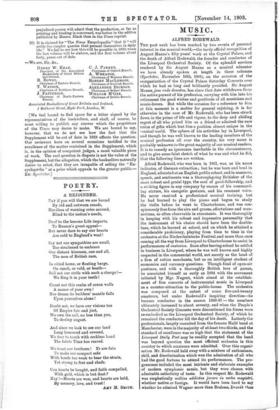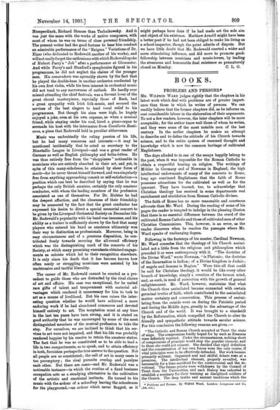MUSIC. -
ALFRED RODEWALD.
THE past week has been marked by two events of personal interest in the musical world,—the tardy official recognition of August Manna's fifty years' work at the Crystal Palace, and the death of Alfred Rodewald, the founder and conductor of the Liverpool Orchestral Society. Of the splendid services rendered by Sir August Manns as a musical educator we have already spoken at length in these columns (Spectator, November 16th, 1901), on the occasion of the reorganisation of the Crystal Palace Saturday Concerts over which he had so long and brilliantly presided. Sir August Manns, jam rude donatus, has since that date withdrawn from the active pursuit of his profession, carrying with him into his retirement the good wishes and gratitude of all musicians and music-lovers. But while the occasion for a reference to him at this moment is a matter for general rejoicing, it is far otherwise in the case of Mr. Rodewald, who has been struck down in the prime of life and vigour, to the deep and abiding regret of all who prized him as a friend or admired the rare union of gifts which lent him a position almost unique in the musical world. The sphere of his activities lay in Liverpool, and though he was well known to the leading members of the musical profession all over the country, his very name is probably unknown to the great majority of our musical readers. It is to remedy an ignorance inevitable in the circumstances, and to give some faint sketch of what he was and what he did, that the following lines are written.
Alfred Rodewald, who was born in 1861, was, as his name indicates, of German extraction; but be was born and bred in England, educated at an English public school, and in manners, speech, and sentiments was a thoroughgoing Britisher of the most robust and genial type, the soul of good-fellowship, and a striking figure in any company by reason of his command- ing stature, his energetic gestures, and his resonant voice. He never received a professional musical training, but he had learned to play the piano and begun to study the violin before he went to Charterhouse, and was con- spicuously free from the airs and graces, affectations and man- nerisms, so often observable in executants. It was thoroughly in keeping with his robust and impressive personality that the instrument of his choice should have been the double- bass, which he learned at school, and on which he attained a considerable proficiency, playing from time to time in the orchestra at the Niederrheinische Festival, and more than once coming all the way from Liverpool to Charterhouse to assist in performances of oratorios. Soon after leaving school he settled in business in Liverpool, where he was well known and highly respected in the commercial world, not merely as the head of a firm of cotton merchants, but as an intelligent student of economics and currency questions. Though fond of open-air pastimes, and with a thoroughly British love of games, be associated himself as early as 1884 with the movement initiated by Mgr. Nugent, which aimed at the establish- ment of free concerts of instrumental music in Liverpool as a counter-attraction to the public-house. The orchestra was composed at the outset of some five-and-twenty amateurs, but under Rodewald's inspiring direction—he became conductor in the season 1886-87 — the numbers ultimately increased to about seventy, and when the People's Orchestral Society Concerts were discontinued his forces were re-embodied as the Liverpool Orchestral Society, of which he remained the conductor till the day of his death. Latterly the professionals, largely recruited from the famous Halle band at Manchester, were in the majority of at least two-thirds, and the standard of excellence was so high that the statement of the Liverpool Daily Post may be readily accepted that the band was beyond question the most efficient orchestra in this country to which amateurs were admitted. Over this organi- sation Mr. Rodewald held sway with a mixture of enthusiasm, skill, and discrimination which won the admiration of all who had the good fortune to attend its performances. The pro- grammes included the most intricate and elaborate examples of modern symphonic music, but they were chosen with admirable catholicity of taste. In this respect Mr. Rodewald was emphatically nullius addictus jurare in verba magistri, whether native or foreign. It would have been hard to say whether he admired Wagner more than Brahma, Dvorak than
Humperdinck, Richard Strauss than Tschaikowsky. And it was just the same with the works of native composers, with most of whom he was on terms of close personal friendship. The present writer had the good fortune to hear him conduct an admirable performance of the "Enigma " Variations of Dr. Elgar (who dedicated to Rodewald another of his works), and will not easily forget the enthusiasm with which Rodewald spoke of Hubert Parry's " Job" after a performance at Gloucester. And while Parry's and Stanford's symphonies figured in his programmes, he did not neglect the claims of the younger men. His comaraderie was agreeably shown by the fact that he played the double-bass in another orchestra conducted by his own first violin, while his keen interest in orchestral music did not tend to any narrowness of outlook. He hardly ever missed attending the chief festivals, was a fervent lover of the great choral masterpieces, especially those of Bach, had a great sympathy with Irish folk-music, and secured the services of the best singers to lend vocal relief to his programmes. But though his aims were high, he hugely enjoyed a joke, even at his own expense, as when a musical friend, while staying under his roof, hired a piano-organ to serenade hie host with the intermezzo from Cavalleria "twit- cana, a piece that Rodewald held in peculiar abhorrence.
Music was undoubtedly the ruling passion of his life, but he had many resources and interests — it may be mentioned incidentally that he acted as secretary to the Bimetallic League in Liverpool—and was a great reader of German as well as English philosophy and belles-lettres. He was thus entirely free from the " shoppiness " noticeable in musicians who are entirely absorbed in their art, and yet, in spite of this many-sidedness, he attained by sheer force of merit—for he never thrust himself forward, and was singularly free from anything approaching conceit or self-satisfaction—a position which can best be described by saying that he was perhaps the only British amateur, certainly the only amateur conductor, with whom the leading members of the profession associated as one of themselves. For Dr. Richter he had the deepest affection, and the closeness of their friendship may be measured by the fact that the great conductor has expressed his desire to direct a special memorial concert to be given by the Liverpool Orchestral Society on December 5th. Mr. Rodewald's popularity with his band was immense, and his ability as a trainer is sufficiently shown by the fact that many players who entered his band as amateurs ultimately won their way to distinction as professionals. Moreover, being in easy circumstances and of a generous disposition, he con- tributed freely towards securing the all-round efficiency which was the distinguishing mark of the concerts of his Society, at which many promising executants obtained engage- ments as soloists which led to their recognition elsewhere. It is only since his death that it has become known how often needy or struggling musicians were assisted by his unobtrusive and tactful liberality.
The career of Mr. Rodewald cannot be erected as a pre- cedent to guide those who are distracted by the rival claims of art and affairs. His case was exceptional, for he united rare gifts of talent and temperament with material ad- vantages which rendered it unnecessary for him to look to art as a means of livelihood. But his case raises the inter- eating question whether he would have achieved a more enduring work if he had abandoned commerce and devoted himself entirely to art. The temptation must at any time in the last ten years have been strong, and it is stated on good authority that he was encouraged by some of the most distinguished members of the musical profession to take the step. For ourselves, we are inclined to think that his ser- vices to art were not impaired, and that his life was probably rendered happier by his resolve to retain the amateur status. The fact that he was so constituted as to be able to lead a life in two compartments, so to speak, and to attain efficiency in both, furnishes perhaps the true answer to the question. Not all people are so constituted ; the call of art in many cases is too peremptory ; the rival pursuits overlap and paralyse each other. But there are cases—and Mr. Rodewald was a noticeable instance—in which the routine of a fixed business occupation acts as a steadying alternative to the cultivation of the artistic and emotional instincts. He turned to his music with the ardour of a schoolboy leaving the schoolroom for the playground,—an ardour which never flagged, as it
might perhaps have done if he had made art the sole aim and object of his existence. Matthew Arnold might have been a better poet if he had not been obliged to make his living as a school-inspector, though the point admits of dispute. But we have little doubt that Mr. Rodewald exerted a wider and more stimulating influence, and did more to promote good. fellowship between musicians and music-lovers, by leading the strenuous and honourable dual existence so prematurely















































 Previous page
Previous page